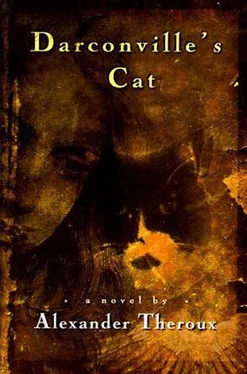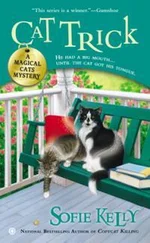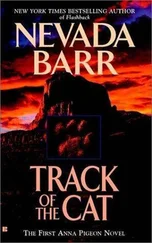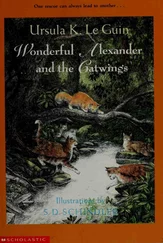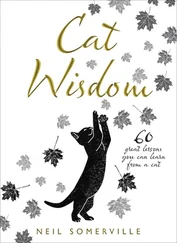It was all quite strange but, if a fantasy, nothing more than that. Darconville had no intention of anything more than that. They had never exchanged a word, and mightn’t, and it didn’t matter. Darconville felt a sacred thrift in the convenience of the Great Abstract, rather like Drayton who addressed his lady under the name of “Idea,” fearing in relation to his dreams to lose wonder in losing faith. The aesthetician, thought Darconville, is mystical, his the mysticism which has no need to believe in objectivity, in the reality of the object: it was pure mysticism. And despite the fact that the distinguishable affections for her that came to him in the obscure of night gave him pause, when, at unsettling moments, he began to think of Earthly Paradise as a social possibility instead of a geographical dream, he piffled all away — because not accustomed to doing anything else — as a glorious if inviting nothing and ascribed all to that preternatural somnolence in which man, immanent with his earthly dreams, seeks for platonic support by unconscious melodious pleading in the equivalence of angels. Thus, thought Darconville, are we open to arrows. It is the nostalgic sigh of air that supports the whistling shaft, shooting at us precisely from nowhere; such, like a waiting target, is the pervious heart. And so not at first sight, nor with a dribbed shot, did Love give the wound. He saw and liked, he liked but did not love.
Crossing the street, Darconville heard the distant sounds from the archery field: the harsh voice still issued commands, the commands still echoed off the dormitory, the dormitory still echoed the crows.
The post-office was ready to close. The student union, the corridors, the rows of numbered mailboxes — all were empty. Darconville managed to shove his letter under the hatch just before the postmistress was ready to bring down the window-roller. He paid the lady, abruptly turned, and his heart quopped: Isabel Rawsthorne stood directly in front of him. She smiled faintly, lowering her eyes, and almost voicelessly asked past him for a stamp. Then the roller hurtled down for good. And in that empty corridor, they found themselves together, for the first time in history, alone.
Darconville swallowed: she was positively beautiful, her skin luminous, glowing with perspiration, her hair pure flax drawn back from her youthful temples showing slight blue veins, and her eyes as clear as the waters of the Dircaean spring. She was still wearing her archery clothes, wristlet, and arm-brace, and, while she seemed mortal enough, he might have been staring upon the angel Zagzagel, flaming above the burning bush.
It was whimsical and fatal, at once.
“Could you c-come to my house tomorrow, Isabel?”
The reply, positive, was almost inaudible.
“I live—”
Her eyes sparkled. “—in the old white house?”
And she was gone, and had been for five minutes — or a year— before Darconville, waking to fact, noticed she had forgotten her stamp.
The weather had fully turned. Darconville walked out of the building under the skirts of a promising thunderstorm, the sky britannia, the clouds ruined at the edges in black mist. A wind came up, cool, smelling of rain. As he passed along the street, heading toward his house, he looked down over the archery field, now empty, and thought: what will happen now? Curiously, he wondered if she were simply the result of his own curiosity about himself, as he might be for her. The trees shushed in the wind, as mist could be felt in the air, and he saw several crows squirt from a gigantic maple, one of which swung high over him like a half-born thought, squawking in loud cracks: actaeon! actaeon !
A line of poetry suddenly came to him from nowhere: “Therefore that he may raise, the Lord throws down.” He recognized the line, thought for a minute, and closed his eyes.
“I am Donne,” quoth he.
Sir, say no more.
Within me ‘tis as if
The green and climbing eyesight of a cat
Crawled near my mind’s poor birds.
— TRUMBULL STICKNEY
THE OVERHANGING WOODS around campus were lovely, a shiny black-green in the fine mist blowing, swirling, in the warm wind that fluttered the poplars and swept yellow leaves from the tall maples across the dark wet walk of Fitts dormitory. A skyful of sullen clouds, piling out of each other, promised a glut of rain. The dorms, their hundred hundred windows lighted against nightfall, shed a fictitious glow over the landscape growing obscure now toward outlying Quinsyburg.
“Where all is Isabel?” asked her roommate, Trinley Moss, to several of her suitemates there who at the last minute were fitting on earrings, brushing out their hair, and touching on lipstick before running off to the dining-hall. It was dinnertime. “Out walking?” asked Glycera Pentlock. “Beats me,” shrugged Childrey Fawcett, trying on a transparent rain hat. “Probably,” said Sheila Mangelwurzel. “I haven’t seen her since archery, have you?” Annabel Lee Jenks, who’d seen her coming out of the post-office earlier, said she mentioned she might not be going to Charlottesville with her this weekend.
Squinting through the dark window, her hands clapped to her temples as blinders, Trinley spied down three floors and suddenly exclaimed, “Now, if that don’t beat all!”—for there was Isabel, still wearing archery tunic and wristlet, skipping heartfree through a cut-path and joyfully kicking up leaves and crunching acorns all the way up the front steps. Trinley shook her head, laughed, and left the window on a charge to join the others scampering out in slickers, raingear, and old trenchcoats faded to white and soiled to brown.
Suddenly, Isabel heard a shout — and, turning to the street, she felt her heart sink.
An old blue car, dented and of an indistinct make, was parked across the way. It was not so much the familiar eyes scowling over the driver’s window, befogged and lowered halfway, that upset her so much. It was the crooking finger that beckoned her. It was the imperious crooking finger. It was the crooking finger.
The sky dissolved in heavy rain. Squealing, the Fitts girls scattered through the puddles in their galoshes, drenched for the farcical umbrellas that had blown inside-out. Winnie Pegue, Castoria Fletcher, Ghiselaine Martin, Shirley Lafoon, Lorinda and Lucinda Belltone, Hallowe’ena Rampling all ran ahead. Late, Childrey Fawcett and Trinley Moss, clutching their rubber hats to their ears for dear life, tore from the doorway and happily spatterdashed in high boots across the lawn toward the archway of the dining-hall. They ran past the mall, hardly looking up at the blue car where two people, sitting within, seemed ghostly silhouettes behind the steamed windows — one motionless, one gesturing wildly as if the entire world was hostile to him and he to the world, as if, as he talked, waging continuous warfare against everything around him.
“Was that the boy,” yelled Childrey through the downpour, giggling, licking driblets from her face, and running as fast as she could, “who drove Isabel down here?”
“Yes,” hooted Trinley.
“What is his name?”
They were running furiously, squelching in long hops across the grass.
“Govert.”
“I said,” gurgled Childrey, just out of earshot, “what is his name , stupid?”
The rain was hammering down in sheets. Trinley, running hard, turned exasperatedly, put her hands into a foghorn, and shouted, “I told you. Govert! Govert van der Slang !”
I met gnomes
In a garden with many-colored flowerbeds.
— MARIA LEUBERG
FRESHMAN PAPERS, phenotypically, leave something to be desired. The stack of them on Darconville’s desk, a bundle of odd-cum-shorts, seemed fathomless as he worked them over with a red pencil long into the night. The work took his full attention: for some reason, Isabel, leaving him a note, had postponed her visit to the following night.
Читать дальше
